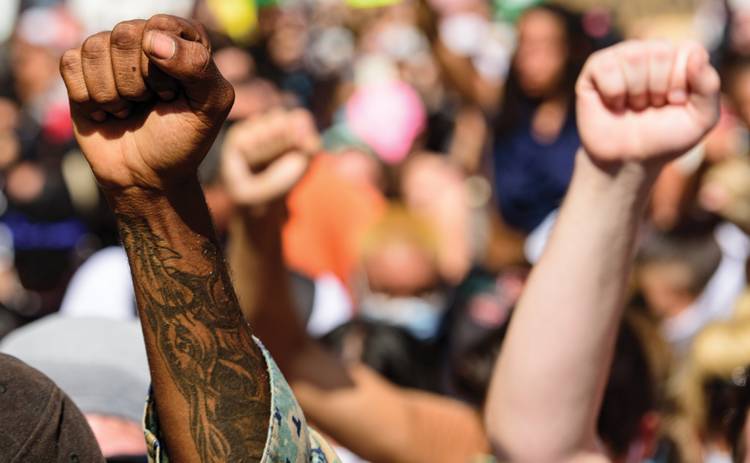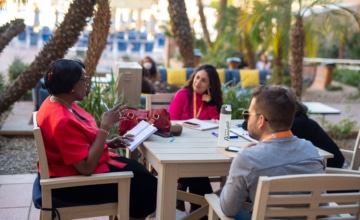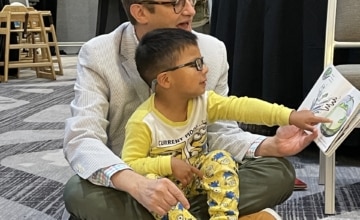Kristen Greene, ZERO TO THREE, Washington, DC
with Sarah LeMoine and Katrina Macasaet, ZERO TO THREE, Washington, DC

Abstract
An exploration of equity and power in infant and early childhood mental health (IECMH) consultation and early childhood education (ECE) relationships requires the examination of diversity, anti-racist values, cross-disciplinary perspectives, and parallel process. Attaining the mission of the early childhood field to support the growth, development, and learning of all young children demands anti-racist thinking and action. In this article, the author shares what she has learned by applying an anti-racist lens to past IECMH consultation experiences, uncovering the dynamics of power and equity that reside in the consultation relationship with ECE programs. In doing so, she hopes to open authentic dialogue with and across the early childhood field.
In his book How to Be an Antiracist, Dr. Ibram X. Kendi (2019) writes,
Race is a power construct of blended difference that lives socially. Race creates new forms of power: the power to categorize and judge, elevate and downgrade, include and exclude. Race makers use that power to process distinct individuals, ethnicities, and nationalities into monolithic races. (p. 41)
In this definition of race, Kendi points to how race has and is used by White people to hold and wield power that privileges them over people of color. Race erases individuals, replacing them with broad group characterizations allowing for judgement and categorization that ultimately maintains the inequities intentionally designed into American society. This quote points out and uncovers the racism inherent within all American systems, including early childhood. The antidote to dismantle this racist system is to be an anti-racist.
As a White early childhood professional whose mission is to support the health, well-being, and development of all young children and their families, it is my daily work to be an anti-racist. Anti-racism is the opposite of racism. Both racism and anti-racism are defined by action. Being racist means endorsing the idea of racial hierarchy, locating the root of problems in groups of people, and allowing racial inequities to persist. Being anti-racist means endorsing the idea of racial equality, identifying racism’s root issues in power and policies, not groups of people, and actively confronting racial inequities (Kendi, 2019). Racism is baked into my White privileged bones as it is in the current systems of institutionalized racism I live and work within. Self-awareness and reflection are my tools to act as an anti-racist, enabling me to see where and when my biases and White privilege show up in relationships and in all my work adding to the harm or pain that Black and Brown people experience daily. I know now, looking back over my years as an early childhood special educator and infant and early childhood mental health (IECMH) consultant, that my racism, my White privilege, likely harmed the families and educators I worked with—and it shames me to realize that, and I despair at how my intentions never were achieved in those moments. But shame doesn’t change a thing. I share my experiences and what I learned in hopes that the pain I caused and hard lessons I learned provide an example of the power of self-reflection to improve work supporting infants, toddlers, and families (see Box 1). I now know that only through examining power and equity in my relationships with other professionals and with families can I unlearn racial inequity (Cargle, 2021) and identify innovative, collaboratively inspired strategies to achieve early childhood’s shared mission and outcomes. In this article I share my experiences of power and equity dynamics within IECMH consultation, share the lessons I learned, and offer resources that may support reflection on the journey to become an anti-racist early childhood professional.
Box 1. Self-Awareness Leads to Better Services for Families
Sarah LeMoine
At ZERO TO THREE, relationships are at the center of all we do. How we do our work is as important as what we do. Embracing, integrating, and focusing on concepts and concrete, actionable steps to advance equity is required to authentically meet the needs of babies, toddlers, and their families, and the workforce—to provide what is needed today and to build a better future. One essential tool we use to ensure this explicit focus in our professional development work is the Irving Harris Foundation’s Diversity-Informed Tenets for Work With Infants, Children & Families (Irving Harris Foundation, n.d.). Importantly, the first Tenet is: “Self-awareness leads to better services for families.” Why start there? It can be challenging to turn the light on ourselves to see and explore what we bring to the ideas of equity, justice, and diversity. This challenge includes examining how lived experiences, background, and perceptions might be impacting and influencing the work. I’m honored to work with colleagues who bravely engage in intentional self-awareness and action. In her article, Kristen shares an example of the introspection we can unpack together, to advance together, across disciplines toward our shared vision. To realize our collective hopes and dreams for each and every young child requires early childhood professionals to be anti-racist. And that work begins, and must continue, within each one of us.
The Diversity-Informed Tenets for Work With Infants, Children and Families are as follows:
- Self-awareness leads to better services for families
- Champion children’s rights globally
- Work to acknowledge privilege and combat discrimination
- Recognize and respect non-dominant bodies of knowledge
- Honor diverse family structures
- Understand that language can hurt or heal
- Support families in their preferred language
- Allocate resources to systems change
- Make space and open pathways
- Advance policy that supports all families
In 2020, a letter from the Harris Foundation Tenets Initiative Advisory Council discussed racialized violence; demanded justice, reparations, and liberation for Black and Brown communities; and highlighted how applying several of the tenets can serve as reminders that to create change on a larger scale, early childhood professionals must start with themselves. In turning to Tenet #1 for example (Self-awareness leads to better services for families) and Tenet #3 (Work to acknowledge privilege and combat discrimination), the council advised those who are Black to consider what is happening in the moment, how oppression is rooted in the mind and body, and how self-care is practiced and regarded. Similarly, professionals should note how oppression may have been internalized and what that means for how they respond or do not respond in a particular moment. The writers called for persons who are non-Black to face, disrupt, and transform the ways that anti-Blackness shows up in their lives, in their work, and in how they perpetuate such anti-Blackness. Non-Black persons were asked to leverage privilege, power, and platforms to expose the truth about racism, historical trauma, and White supremacy. Professionals were asked to expose how anti-Blackness manifests in early childhood work, organizations, and systems and to choose to transform it.
These calls, which were supported by ZERO TO THREE, for action, for awareness, and for change apply to all engaged in early childhood professions and systems. The National Association for the Education of Young Children (NAEYC) position statement on Advancing Equity in Early Childhood Education (2019), echoed the ideas shared in the tenets in recommending that everyone involved in early childhood education (ECE) aspire to these goals and actions in practice:
- Build awareness and understanding of your culture, personal beliefs, values, and biases.
- Recognize the power and benefits of diversity and inclusivity.
- Take responsibility for biased actions, even if unintended, and actively work to repair the harm.
- Acknowledge and seek to understand structural inequities and their impact over time.
- View your commitment to cultural responsiveness as an ongoing process.
- Recognize the professional knowledge base is changing from being based on primarily White, middle-class children without disabilities to more diverse knowledge bases and normative approaches. (NAEYC, 2019, p. 6)
If Not Now, Then When
Today’s political, social, health, and economic climates in the United States have brought into focus how divided the nation is when it comes to race and equity. Large systems, including early childhood education (ECE) and IECMH, are redoubling efforts to explore issues of diversity, equity, and inclusion as they apply to systems, services, staffing, and families served. 2020 shone a light on more than 400 years of racism in America and has served as a wake-up call for many White people and a tipping point for many people of color. The times demand that individuals become anti-racist and transform our racist society. If one thought they were living in a post-racist time, they were wrong. Words like microaggressions, biases, and discrimination were used to avoid the word “racism.” It may have felt that using such terms indicated progress, but it hasn’t helped to eliminate the R-word (Kendi, 2019). Witnessing George Floyd’s public execution and the outrage and utter despair of Black voices revealed the stark reality. Racial inequities related to COVID-19 also illuminated the systemic racism in health and health care, regardless of income or education. There is much work to do. In this moment, I invite you to think more deeply with me, and together, about how racism and other biases implicitly and explicitly wreak havoc in the relationships we have with each other and the children and families we serve and stand in the way of our mission.
My Awakening and Urgency as a White Ally
Over the past 30 years, I have worked side-by-side with all sectors of the early childhood field, noticing and feeling underlying power currents, listening to statements that raised one group of professionals above another, experiencing and witnessing uncomfortable and confusing pauses, and sometimes polite but clear dismissal of ideas and knowledge. I knew deep down that these experiences were based on the idea that some early childhood sectors or some people in those sectors were perceived or treated as “less than” others. Did those behaviors reflect established power dynamics within the field, related to discrimination, sexism, or racism? Were individuals being “put in their place”? In a field that advocates for multi-, inter- and transdisciplinary teaming to meet the complex needs of young children and families, how do implicit bias and power differences impact the effectiveness and ultimate achievement of its goals? If colleagues treat each other this way, how do these experiences play out with the families they serve? As an early childhood professional, am I getting in my own way? Am I creating barriers to achieving early childhood’s shared mission?
Everyone has implicit bias caused by living in a classist, racist society that built racist institutions and systems benefiting those who are White. To achieve positive outcomes for all children and families, collaboration is our greatest asset (ZERO TO THREE, 2018b). How can professionals engage in meaningful, real collaboration if inequitable power and implicit biases live in these relationships? The answer is they cannot. Power, privilege, and position exist in society, and in relationships, intersecting with differences, and resulting in oppression (Johnson, 2018).
Societal Inequities Are Mirrored in Professional Settings
Power dynamics are a part of every relationship and every team. Consultative relationships, including IECMH consultation in ECE settings, experience power dynamics and they can be a hidden element of collaboration if care is not taken to address imbalances. The power balance (or imbalance) of any relationship or team can be magnified and complicated by racial and social inequities. Winter and Munn-Giddings (2001) counseled IECMH consultants to recognize the temptation to be the source of knowledge or have the “last word” in interpreting the dialogue with consultee(s). They advocated for a focus on reflective facilitation in which consultants seek to be aware of their own tendencies toward power and critique their input in the relationship, thus attempting to reduce the status and power differences in the consultation process. IECMH consultative relationships cannot achieve the desired outcomes when educators’ voices and perspectives do not inform the dialogue. Social power can have positive and negative effects within consultation relationships (Wilson et al., 2008). Social power can lead to the consultee taking advice or rejecting it, seeing a consultant as legitimate and helpful or as yet another voice telling her what to do while not understanding her ideas. Families are diverse, and the voices that identify strategies to support them must reflect the same diversity if they are to succeed.
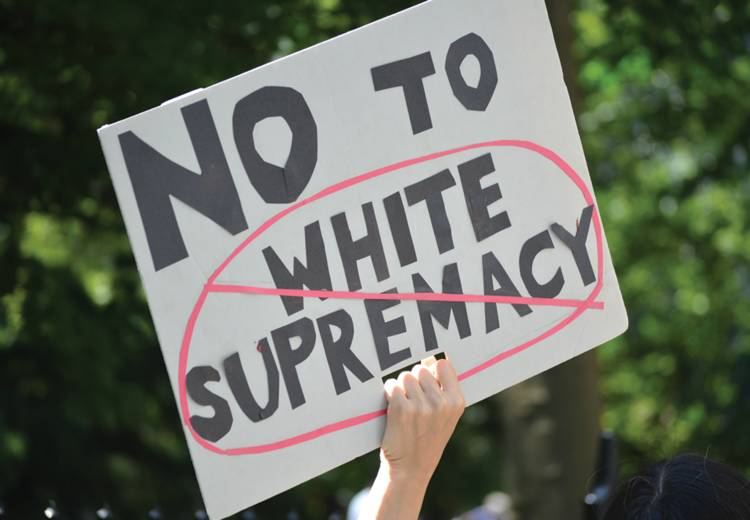
Today’s political, social, health, and economic climates in the United States have brought into focus how divided the nation is when it comes to race and equity. Photo: Christopher Penler/shutterstock
Who Are IECMH Consultants? Who Are Early Childhood Educators?
According to the Center for the Study of Child Care Employment (Whitebook et al., 2018), approximately 2 million people, primarily women, educate more than 10 million children from birth to 5 years in the US, across all ECE settings. When stratified by race/ethnicity comparing job roles, age of children served, and income, the ECE field reveals jarring inequities. While the majority of early childhood educators identify as White, more than 40% are women of color. Women of color make less money and are more likely to work in aide or assistant positions than their White colleagues. Women of color, particularly African American women, are the majority of the workforce educating infants and toddlers and no matter their educational attainment, they are being paid the lowest salaries in the ECE field. In particular, center-based African American early educators are more likely to earn less than $15 per hour than all other racial/ethnic groups in the ECE workforce nationwide.
Currently, IECMH consultants come from various pathways into this professional role, making their definition and demographics as a professional group challenging. Using mental health clinicians as a guide, the American Psychological Association (2018) noted the following demographics: most clinicians are White women, followed by much smaller numbers of Latinx and Black mental health professionals, also primarily female. Psychologists generally hold doctoral degrees. For social workers, the National Workforce Initiative (George Washington University Health Workforce Institute, 2017) described the proportions of the social work workforce by race from highest to lowest as White, followed by African American and then Latinx. Social workers and counselors may hold bachelor’s, master’s, or doctoral degrees. So, while gender proportions in clinicians appear to mirror those for ECE, and racial proportions do also to a lesser degree, the level of education and salary of IECMH consultants is typically higher. Given these demographics, it is important for each consultation arrangement to consider issues of equity, power, and cultural similarities and diversity in order to provide true support rather than more barriers.
Americans live in a racist society that oppresses women of color. Systemic racism lives here in this moment, right now. Early childhood professionals must acknowledge and identify biases to diminish and eradicate their impact, reducing or removing the barriers that may stand in the way while seeking to inform each other’s practices or to create solutions together. While some demographic details are challenging to uncover in fluid early childhood professions, the limited existing data underscore the need to be sensitive to differences in education, income, and social status between IECMH consultants and early childhood educators. There is no legitimacy in debating whether or not these inequities are a result of systemic racism. Like the rest of the country’s social systems, the inequities in the early childhood field reflect a racist history. Therefore, there is a need for both IECMH consultants and early childhood educators to practice self-awareness, to seek strategies to see and understand individual differences and perspectives, and to explore power dynamics, particularly with infant–toddler educators, to achieve the goals of IECMH and ECE programs today.
How Do Power, Privilege, and Bias Play Out in IECMH Consultation in ECE Programs?
Melanie, an IECMH consultant, slumped into her chair as she sat down for her weekly reflective supervision meeting with Nadia, her supervisor. “I am so frustrated! I cannot get through to Amanda about ways to play with the babies. It’s been over a month, and she won’t try anything I share with her. All she wants me to do is sit on the floor with the babies while she changes diapers. I’ve tried modeling and playing with the babies, trying to get her to slow down and spend time with me, but I feel in the way. So far, I don’t see any changes in her behavior with the children, and the classroom space looks the same as before we completed our evaluation. She just doesn’t get it! I don’t think she wants my help. The more I seem to try to help, the less successful I feel.”
After listening for a bit, Nadia says, “Tell me about Amanda, and the early childhood education program she works in.” “Well”, says Melanie, “she is in her 20s, and lives in the neighborhood where the early childhood program is located. She has two children in other classrooms. I think she has her high school degree and is taking some courses at the community college here and there. Her education is pretty slim when it comes to child development and teaching.” “Now tell me about yourself, Melanie,” said Nadia. Melanie looked puzzled. “Well”… she started, “why? Why does that matter? Are you saying I am doing something wrong?” “No”, said Nadia gently, “but taking a look at who you and Amanda are as individuals can be a good place to pause and reflect, when you feel that you are not making progress together.”

How can professionals engage in meaningful, real collaboration if inequitable power and implicit biases live in these relationships? Photo: Flamingo Images/shutterstock
Given the demographics listed previously, it is not surprising to learn that Melanie is White and Amanda is Black. Without considering the role of implicit bias, privilege, and power dynamics present in this consultation relationship, how will collaboration, trust, and learning occur? (See Box 2.) Melanie may begin to see herself as ineffective or to see educators as resistant–and by doing so, judge and downgrade (Kendi, 2019) early childhood educators, in particular those working with infants and toddlers, as was demonstrated by Melanie saying to her colleagues, “She just doesn’t get it!”.
Box 2. Self-Knowledge Is Essential for Effective Collaboration
Katrina Macasaet
One of the most difficult endeavors a person can do is to hold a mirror up to oneself and to look closely. It’s through this action that one can see the quiet, slight details that are missed when looking from afar. 2020 has revealed two things about race in our society: it has magnified the inequities that Black, Indigenous, and people of color (BIPOC) experience every day with such gravity that it is too present to ignore. And it has revealed the discrimination that people of color have often experienced but have not had the voice or power to share.
An old adage says that it takes a village to raise a child. And today, raising a child–especially for those who identify as BIPOC—can feel like such a monumental task that families are often looking for their village. For these families, it can feel even more daunting—like moving an established and deeply rooted mountain. My early childhood colleagues and I are part of that village for families. Early childhood education and infant and early childhood mental health professionals each play a vital role in supporting young children—especially the most vulnerable. But professionals cannot move that mountain of change and make progress if they themselves do not acknowledge the imbalances tilting the scale as they do their work. If one were to hold a mirror to the village supporting families today, there is a hierarchy to the village’s structure. This hierarchy can diminish the recognized value early childhood professionals, particularly early childhood educators, provide in the lives of young children and their families. For BIPOC individuals who are lower in the professional hierarchy, the inequities are compounded by existing within society’s historically oppressive systems.
The Diversity-Informed Tenets for Work With Infants, Children and Families’ third Tenet is “Work to acknowledge privilege and combat discrimination” (Irving Harris Foundation, n.d.). These powerful words signal a strong call to action for all, but especially for White professionals in the field to acknowledge that being White has privilege as does one’s professional title. Professional achievement is tied to a system that has lowered the fruit of success from the tree of opportunity for some, limiting the access to others, sometimes to such an extreme extent that this tree of opportunity does not even seem real. Acknowledging privilege is such a significant step, not only in doing anti-racist work, but also in the validation of the experiences of so many who have felt oppressed or devalued. As an immigrant person of color in the US, I experienced how Whiteness carries privilege, or rather my lack of Whiteness has taught me a lesson so apparent that it did not need to be said for me to learn. The work now of White allies who recognize that there is privilege is to makes conscious what has been unconscious, as David Foster Wallace explained through his parable about the fish who do not know they are in water (Wallace, 2005). Systemic racism has created an environment that supports White people and has provided less opportunities for people of color. The second part of the Tenet is focused on combatting discrimination. But that cannot happen if people do not hold the mirror up to themselves and their work to take a closer look at how racism has had an impact.
In the previous vignette, Dr. Greene shares the experience of a Black educator named Amanda. I was like Amanda. I share the experience of many other early childhood educators who have felt diminished or unheard. My experience does not represent all our experiences, but the themes are familiar. I have had instances where my familiarity with children and their routines and the anecdotes I shared about families were less valued and appeared as mere footnotes on a report. When my expertise was challenged. When collaboration was offered but only by an individual rather than by all parties involved, so the system did not change. These familiar themes magnify the caste system in the early childhood field and in society. In order to work together toward the mission for equitable services for all babies, toddlers, and their families, early childhood professionals must first begin with looking closely at their own ideas, values, and practices and how they work together in support of common goals. Holding up the mirror to oneself is difficult, yes, but self-reflection is a significant step toward anti-racism.

The power balance (or imbalance) of any relationship or team can be magnified and complicated by racial and social inequities. Photo: fizkes/shutterstock
How Do These Efforts Contribute to Positive and Equitable Outcomes With Babies and Families?
When early childhood professionals work together across disciplines, effectively sharing and building knowledge and understanding of how to accomplish a shared goal, they create opportunities for positive outcomes for the children and families they serve. Studies of transdisciplinary teams in fields such as medicine and early intervention have shown that, over time, team members learn from their colleagues, which not only helps them to create a higher quality, more beneficial experience for families but also is an enjoyable professional growth experience. The sense of identity and purpose that they develop as a team transcends the tasks they perform when working with the families they serve (ZERO TO THREE, 2018a). According to ZERO TO THREE (2018b), better outcomes for babies and families result from cross-sector collaboration. Recognizing that whether it is coaching, consultation, mentoring, supervision, or other early childhood help-giving practices and models, at the core of effectiveness lies the relationship between individuals—the consultant and the consultee (Rush & Shelden, 2011). Professionals must know themselves and see each other to be helpful and helped.
Dismantling Inequitable Power Dynamics in IECMH Consultative Relationships
First and foremost, the early childhood field must take action to increase diversity in IECMH, ECE, and all early childhood professional disciplines by addressing structural inequities across society. Most important, the field can strengthen access to higher education, professional career pathways, and recruitment and hiring policies. Such policies and their measurable implementation can advance equity and embrace diversity (National Association for the Education of Young Children [NAEYC], 2019). These are important steps. What can individuals do? Professionals can examine where they are now and what they can currently do in-field, in their current relationships as early childhood professionals. White early childhood professionals can become allies and can take personal responsibility for educating themselves about issues of privilege and power in the field. This self-education can help professionals better understand, but not accept, the current ECE system. IECMH consultants can raise their voices in support of early childhood educators, especially infant–toddler educators, to identify models that help build collaborative relationships. Strategies early childhood professionals can use include the following:
- Become an ally. To be an ally, self-examination is not enough (Yellow Bird, 2020). Identifying and acknowledging one’s social location as defined by race, gender, sexual orientation and identity, age, ability, religion, and social class in our society, provides a starting place to understand the influence of living in a racist society on one’s values, thinking, and behavior (Johnson, 2018). Being reflective on how social location has impacted and currently impacts behavior is the next step. Acknowledging White privilege, the unequal distribution of power, and oppression of people of color in society may be painful, as shame is real. Doing anti-racist work can feel overwhelming—thinking an individual can’t change the system can feel real—that’s the power of privilege. But when professionals look at history, it is clear these systems have not been in place for all of it. Systems do change and are changing right now. Oppressive systems stay in place when individuals believe they are without power. Allies hold power and privilege and can use it to bring about change and equity. Allies examine and recognize where they sit—are they privileged and if so, how can they empower infant–toddler educators? For example, in the vignette, after speaking with Nadia, Melanie recognizes the opportunity she has to reflect on her practice is itself a benefit of position and status. Melanie decides to talk to Amanda about the barriers she faces to engaging in reflective practice and supports her in advocating for these opportunities with her program director. By doing so, Melanie acknowledges the system that Amanda functions within and the barriers it presents to changing her teaching practice. Further, Melanie recognizes her privileged position and status in her state’s early childhood field and advocates in state policy meetings on behalf of infant–toddler educators to establish paid planning time in state early childhood education licensing policies—arguing its value toward achieving IECMH goals and outcomes.
- Understand and acknowledge the issues of power and privilege in the early childhood field. Along with being an ally comes responsibility to understand how the early childhood field reflects the social inequities of the country. IECMH consultants can create consultative relationships informed by their understanding of these inequities and the impact on the daily work and lives of early childhood educators. As stated previously, women of color work in the lowest paid, lowest status positions in the ECE field (Whitebook et al., 2018). How might that status and experience inform, consciously or unconsciously, consultative relationships and how each individual views their role in it? Building knowledge about the inequalities in power, privilege, and status in the field is vital, particularly for those who are privileged. The Power to the Profession Taskforce (NAEYC, 2020) created the Unifying Framework for the Early Childhood Education Profession. In it the Taskforce outlines the challenges faced by early childhood educators today as well as a pathway to addressing those challenges. Staying informed about challenges and attending to the voice of the field itself as it identifies solutions is a great step to eradicating power inequities. Valuing and raising up voices of those who are marginalized is a key role of an ally.
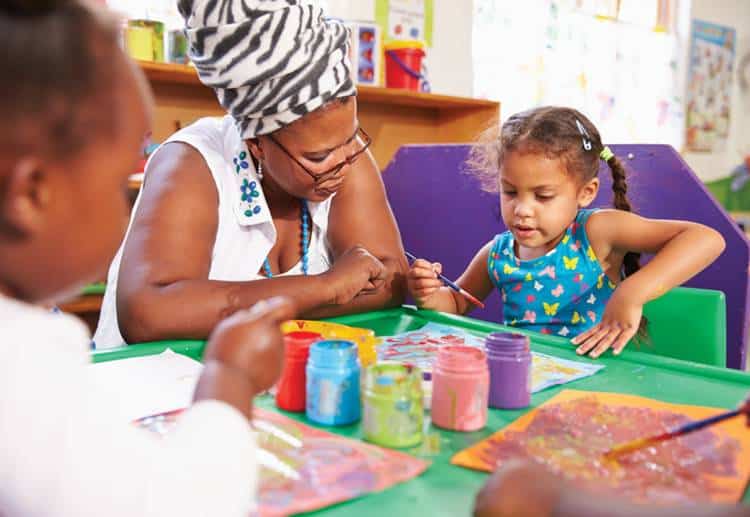
While the majority of early childhood educators identify as White, more than 40% are women of color. Photo: Monkey Business Images/shutterstock
- IECMH professionals can dive deeper and learn about ECE in their state as well as the organizational policies of the ECE programs they consult within. As part of the work as a consultant, they can learn about the realities of teacher to child ratios, program staffing models and policies, classroom budgets, quality rating systems, early learning standards and professional competencies, as well as classroom curriculums to better collaborate with educators. These factors play an important role in ECE today, serving as both parameters and resources to the work and educators’ ultimate goals for the children they serve.
- Utilize resources and frameworks that support collaboration and raise up the importance of infant– toddler educators’ professional role and valuable contribution in society. Although recognized as essential workers, early childhood and infant–toddler educators are still viewed by many in society as child care technicians, babysitters, or at best, professional caregivers. This view is the result of a long history of public policies institutionalizing gender and racial discrimination in the country. In the Power to the Profession’s Unifying Framework (NAEYC, 2020), the ECE professionals claim the title of educator for those working in ECE. The title early childhood educator incorporates caregiving, recognizing that positive relationships sit at the core of learning for humans at any age but most especially, as argued by Dean, LeMoine, and Mayoral (2016, 2019) for infants, toddlers, and the youngest learners.
- Develop common language and collaboration. Recognizing that IECMH consultation is in fact collaboration between two professional early childhood disciplines–IECMH and ECE—it is useful to consider how to improve that collaboration. One way is through developing a common language and way of communicating that highlights the knowledge, skills, and attitudes valued across all early childhood sectors (ZERO TO THREE, 2018b). A common language will include talking about the distinction between consultation and supervision. Using the concept of parallel process in the IECMHC relationship is also key in looking at how relationships impact other relationships. Recognizing diverse knowledge, skills, and attitudes goes a long way to communicating equity in the IECMHC relationship. Further, acknowledging that infant–toddler educators are critical to the healthy development and learning of babies and toddlers, and that their role possesses specialized knowledge and competencies, raises their status in a stratified educational system. Understanding the ZERO TO THREE Critical Competencies for Infant–Toddler EducatorsTM (Dean et al. 2016, 2019) and incorporating this model into consultation work builds both professionals’ relationships with and the capacity of those they support.
- Respect the ECE program and its professionals. Society has yet to recognize the professionalism of these programs and the people who work in them. IECMH professionals can communicate respect within their interactions. Understanding the professional skills and complexity of infant–toddler education should influence EC professionals’ actions in programs. Presenting themselves as a visitor, a helper, and a new member of their ECE program community communicates respect for the existing policies, roles, and responsibilities. Seeking connections with everyone–from the receptionist or office manager to the families whose children are in the classrooms—establishes their importance as well as the professionals’ role and expertise in the ECE program.
What Is Gained by Addressing the Power and Equity Issues Prevalent in the Field?
There is much to gain from intentional self-reflection and exploration of power dynamics. First, everyone can learn more about who they are and their racial experiences and/or privilege, and develop an understanding of others’ experience in this society. This introspection is foundational to effective collaboration with each other. Second is the opportunity to create meaningful learning experiences for infants and toddlers with educators, and parallel learnings as an early childhood professional in meaningful partnership. Together IECMH consultants and educators can raise and explore questions like: What ideas have yet to be voiced due to power differences? What knowledge has yet to be ascertained? What strategies are yet to be unsurfaced? How can we, as professionals, truly achieve shared goals? Diversity in voice leads to diversity in ideas. Diverse ideas lead to creative solutions beyond what any one individual could produce. Professionals can only achieve these goals through anti-racist work. Every step forward is important. This is a moment of opportunity. Every intentional action means something. My colleagues and I at ZERO TO THREE see you; we hear you. You matter. What you do matters. Make the difference all professionals want to make. Start with yourself. I am. I hope you will join me on this journey.

Acknowledging that infant–toddler educators are critical to the healthy development and learning of babies and toddlers, and that their role possesses specialized knowledge and competencies, raises their status in a stratified educational system. Photo: Krakenimages.com/shutterstock
Author Bios
Kristen Greene, PhD, is associate director, Professional Development and Workforce Innovations, Products and Innovation at ZERO TO THREE. A key member of the Leadership Team, Kristen works to conceptualize, develop, implement, enhance, and expand ZERO TO THREE’s competency-based professional development products and services. A co-author of the ZERO TO THREE Critical Competencies for Infant-Toddler EducatorsTM Course curriculum, Dr. Greene leads pilot offerings from conception through delivery, including: in-person and online courses, training-of-trainer events, and ZERO TO THREE Trainer Certification, and she directs the implementation of all PID professional development products and services. She is a trusted expert, leading presentations at state, regional, national, and occasional international conferences, and meetings. Dr. Greene also serves as a technical assistance provider, liaison, and program representative for division activities with internal and external partners and stakeholders, including in notable national/international workgroups and advisory committees. She joined ZERO TO THREE in May 2016, after serving as an early childhood education (ECE) specialist, under a federal Race to the Top–Early Childhood grant, at the Rhode Island Department of Education. She holds a doctorate in early childhood, family and literacy studies and brings a wide range of additional professional experience focused on young children’s development; with expertise on social–emotional development and disabilities, ECE, and effective ECE professional development and systems that support practice change. These experiences include positions as an early childhood special education teacher, early childhood education administrator, higher education faculty member, infant and early childhood consultant, and Early Head Start infant toddler training and technical assistance specialist.
Sarah LeMoine, MS, is senior director, Professional Development and Workforce Innovations, Products and Innovation at ZERO TO THREE. In this role, she advances ZERO TO THREE’s education strategy and coordinates these efforts with international, national, and state partners. Ms. LeMoine has focused her career on early childhood professional development systems and workforce issues. She has 30 years of extensive experience ranging from direct service work to national-level research and writing, technical assistance and training, policy analysis, and advocacy. Previously, she directed ACF’s PDW Center at ZERO TO THREE, the National Association for the Education of Young Children’s State Workforce Systems Policy, and held leadership and technical assistance positions with the National Child Care Information Center and the Wheelock College Center for Career Development.
Katrina Macasaet, MA, is manager, Professional Development and Workforce Innovations, Products and Innovation at ZERO TO THREE. Ms. Macasaet leads the design and delivery of presentations at state, regional, and national early childhood conferences and meetings. In addition, she contributes to the development of research-based and evidence-informed infant–toddler competencies, professional learning options, and other department content. Ms. Macasaet joined ZERO TO THREE in January 2017 after working as an instructional coach for the Orange County Department of Education and as a child development instructor for Saddleback College. She has an undergraduate degree in early childhood education and a master’s degree in human development.
Suggested Citation
Greene, K., with LeMoine, S., & Macasaet, K. (2021). Perspectives: Equity and power dynamics: Effective collaboration in infant and early childhood mental health consultation and early childhood education. ZERO TO THREE Journal, 41(3), 59–67.
References
American Psychological Association. (2018). Demographics of the U.S. psychology workforce: Findings from the 2007-2016 American Community Survey. Washington, DC: Author.
Cargle, R. (2021, January 25). The great unlearn. link
Dean, A., LeMoine, S., & Mayoral, M. (2016, 2019). ZERO TO THREE Critical competencies for infant-toddler educatorsTM. ZERO TO THREE.
George Washington University Health Workforce Institute. (2017). Profile of the social work workforce: A report to Council on Social Work Education and National Workforce Initiative Steering Committee.
Irving Harris Foundation. (n.d.). Overview of the tenets. link
Johnson, A. (2018). Privilege, power, and difference. McGraw-Hill Education.
Kendi, I. (2019). How to be an antiracist. Random House.
National Association for the Education of Young Children. (2019). Advancing equity in early childhood education. link
National Association for the Education of Young Children. (2020). Unifying framework for the early childhood education profession. link
Rush, D., & Shelden, M. (2011). The early childhood coaching handbook. Brookes
Wallace, D. F. (2005, May 21). This is water by David Foster Wallace. fs. link
Whitebook, M., McLean, C., Austin, L. J. E., & Edwards, B. (2018). Early childhood workforce index 2018. link
Wilson, K., Erchul, W., & Raven, B. (2008). The likelihood of use of social power strategies by school psychologists when consulting with teachers. Journal of Educational and Psychological Consultation, 18(2), 101–123.
Winter, R., & Munn-Giddings, C. (2001). A handbook for action research in health and social care. Routledge.
Yellow Bird, M. (2020, Oct. 6). Defunding mindfulness: While we were sitting on our cushions a new world order was being ushered in [Conference session]. ZERO TO THREE Annual Conference 2020.
ZERO TO THREE. (2018a). The Prenatal to Age 5 Workforce Development Project: Findings and recommendations for cross-sector work in the prenatal to age 5 Workforce.
ZERO TO THREE. (2018b). ZERO TO THREE competencies for prenatal to age 5 (P-5) professionals.

